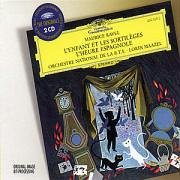| All Artists: Maurice Ravel, Nikolai Rimsky-Korsakov, Igor Stravinsky, Lorin Maazel, Berliner Philharmoniker, Radio Symphonie Orchester, Orchestre National de la R.T.F., Jane Berbié, Gabriel Bacquier, José van Dam Title: Ravel, Rimsky-Korsakov & Stravinsky: Orchestral Works Members Wishing: 1 Total Copies: 0 Label: Deutsche Grammophon Release Date: 11/11/1997 Genre: Classical Styles: Opera & Classical Vocal, Forms & Genres, Theatrical, Incidental & Program Music, Historical Periods, Romantic (c.1820-1910) Number of Discs: 2 SwapaCD Credits: 2 UPC: 028944976922 |
Search - Maurice Ravel, Nikolai Rimsky-Korsakov, Igor Stravinsky :: Ravel, Rimsky-Korsakov & Stravinsky: Orchestral Works
 | Maurice Ravel, Nikolai Rimsky-Korsakov, Igor Stravinsky Ravel, Rimsky-Korsakov & Stravinsky: Orchestral Works Genre: Classical
|
Larger Image |
CD Details |
CD ReviewsRavel at his most playful - a farce and a nightmare. darragh o'donoghue | 07/04/2001 (5 out of 5 stars) "There aren't nearly enough farces in opera, and 'L'heure Espagnole' is one of the funniest, as well as one of the weirdest. It's been called Feydeauesque, but that's Feydeau rewritten by Hoffmann - instead of hiding in cupboards or running in and out of bedrooms, the various inadequate lovers conceal themselves in clocks carried up to the amative wife's bedroom by a dim, but brawny muleteer. The music is a delight, Ravel revelling in his beloved Spanish idiom, and creating wonderful comic effects with a huge orchestra used with the lightness of a pencil. Most astonishing is the recreation of a clock shop, with its conflicting rhythms, parodying the necessity of time in music by creating an amiably arhythmic din. The opera is also a neat satire on the bourgeoisie, with an apparently hoodwinked clockmaker profiting from his wife's infidelities.If 'L'heure' is a satiric farce, than 'L'enfant et les sortileges' is a fantasy and a nightmare. A sullen brat is grounded for not doing his homework. In a violent fit he vandalises his bedroom. Frighteningly, shards of the household gods come to life, taunting, abusing and inflicting dreadful violence on the boy. Colette's wonderfully playful libretto has been called a Disneyesque morality tale, but the sadistic relish with which the boy is made to learn his lesson has the cruelty of older, European traditions. Highlights include the jazzy ire of a broken teapot, the harrowing fragmentation of a princess and her fairy tale, and a gloriously Ravelian recreation of a magical garden, full of wonder and violence. The music is a Miro painting come to life, all wit and colour, strange sounds and shapes: enigmatic, scary, delicious.The fillers are approrpriate to each opera and point to the Russian influnece on Ravel - Rimsky-Korsakov's rollercoaster 'Capriccio Espagnole' and Stravinsky's berserk ballet 'Les Chants de rossignol', with its tantalising hints of 'The Rite of Spring'. Anyone familiar with Maazel's later, rather stodgy art will be amazed by his youthful fizz here, and the miraculous singing stretches all expectations of the voice's capabilities." Frighteningly Good! Wayne A. | Belfast, Northern Ireland | 04/07/2004 (5 out of 5 stars) "When one comes across recordings like this there's always a risk of hyperbole. As simple as possible: these are exciting, inspiring, near-perfect performances of the Ravel operas. The engineering matches in quality. If you like Ravel, if you like opera, or if you're just curious about what a "near-perfect" performance sounds like then jump at this set. Also, the fillers are equally stunning. I've never heard (or even hoped for) a Capriccio Espagnol as striking as the one included. This collection, along with DG's release of Maazel's Firebird and El Amor Brujo (in this same series--and also great) has prompted a re-examination of earlier recordings by Lorin Maazel. Thanks DG and...Wow!" Wonderful recording of a wonderful show Adelaide | Sarasota, FL, USA | 11/24/2001 (5 out of 5 stars) "I was in a production of 'L'enfant...' last year, and was unable to find the recording in any of our local music stores. I finally found it, and it was worth the wait, especially coupled with Ravel's other work.
It's my favorite opera by Ravel, who is in turn my favorite composer. Good stuff." |

 Track Listings (29) - Disc #1
Track Listings (29) - Disc #1